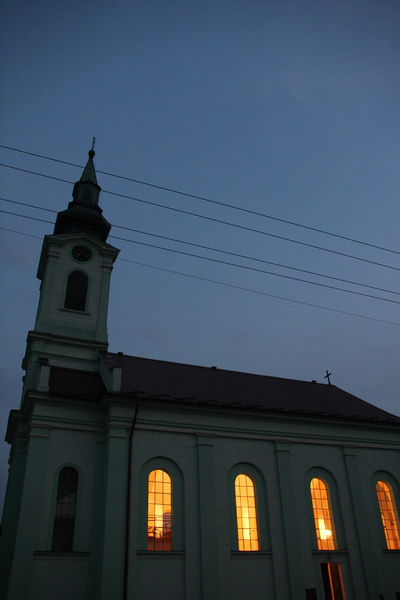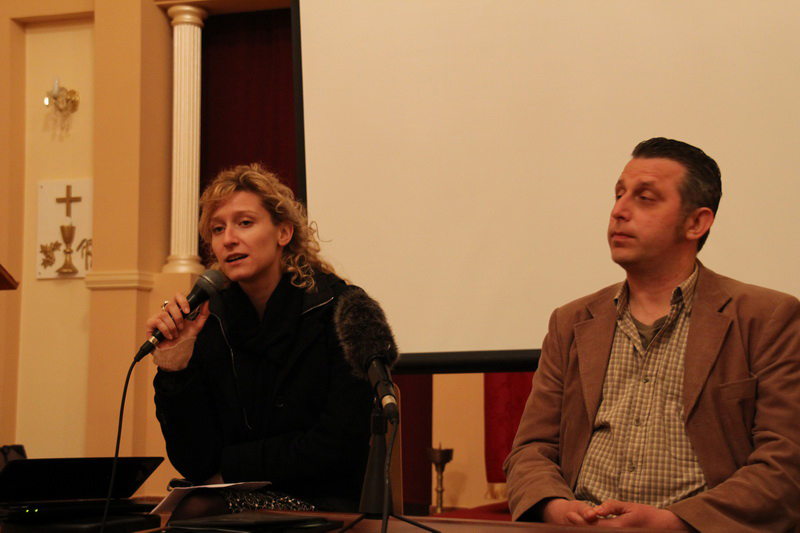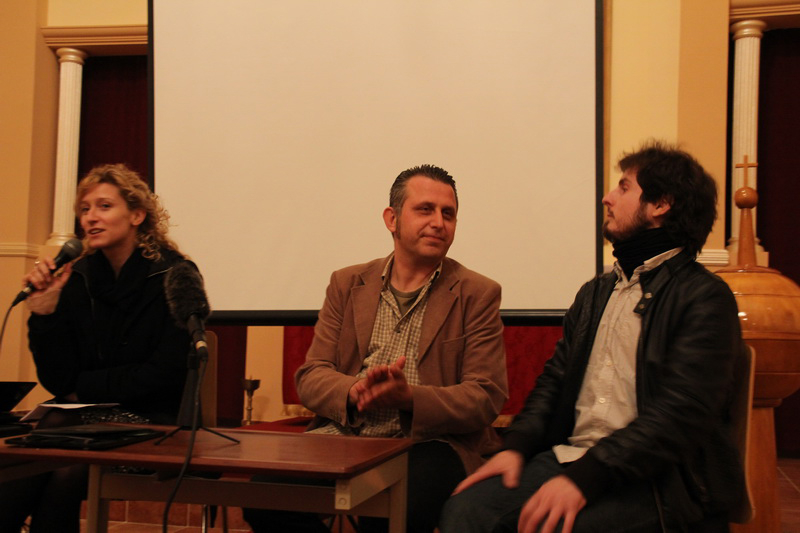“Schuld muss individuell sein” – Zweite Station der Film-Tour in Feketitsch (18. 3. 2012)
Die zweite Station der Vojvodina-Film-Tour führte das Team um Regisseur Marko Cvejic (Die Donauschwaben/Danube Swabians/Podunavske Svabe) am 18. März 2012 nach Feketitsch (Feketić), das laut Volkszählung aus dem Jahre 2002 über 4308 Einwohner verfügt, darunter 60 Prozent Magyaren. Moderiert wurde die Veranstaltung von der Dramaturgin Ljubinka Stojanovic, am Gespräch nahmen Philosophie-Professor Zlatko Jelisavac und Regisseur Marko Cvejic teil. “Es ist unmöglich, dass die ganze Nation schuldig sein kann für Verbrechen, die Schuld muss individuell sein”, kritisierte Cvejic die kollektive Verurteilung der Donauschwaben durch die Tito-Partisanen.

Der Veranstaltungsort: Evangelische Kirche in Feketitsch - Foto: Visnja Cupic Jovanovic
Sinoć je u Evangelističkoj crkvi, u Feketiću, održana projekcija filma i nakon toga, panel diskusija u okviru vojvođanske turneje filma “Podunavske Švabe”. Događaju je prisustvovalo oko 30 predstavnika/-ca lokalne zajednice.
Skup je moderirala Ljubinka Stojanović, dramaturškinja, a lični utisak o filmu i temi, dali su Zlatko Jelisavac, profesor filozofije i Marko Cvejić, reditelj i scenarista filma.
U uvodnom delu panel diskusije, reditelj je govorio o problemima na koje je nailazio tokom snimanja filma, pre svega na zatvorenost ljudi i tabuizaciju ovog pitanja, do toga da su se mnogi ljudi plašili da govore javno o svojim stradanjima za vreme progona, i to prvi put učinili u ovom filmu. Igrani deo filma, priča o ljubavi dvoje mladih koji pripadaju različitim kulturama i socijalnim miljeima, bio je logičan sled i ono što je povezalo sva svedočanstva u filmsku formu.
Profesor Zlatko Jelisavac pozvao se na filozofe koji su obrađivali temu kolektivne krivice i odgovornosti. Ukazao je na važnost istorijskog pamćenja i beleženja svedočanstava Nemaca, jer se ne sme dozvoliti da njihova istorija bude izbrisana. “Intimna priča pojedinca je ono što nas povezuje sa pričom, i na taj način možemo da osetimo kroz šta su prolazili, i to je pravi način da se istorija očuva”, smatra profesor Jelisavac.

Moderatorin Ljubinka Stojanovic und Philosophie-Professor Zlatko Jelisavac - Foto: Visnja Cupic Jovanovic
“Čestitam, pun sam utisaka!”, rekao je jedan od učesnika nakon filma. “I jedna žrtva je mnogo. To treba imati u vidu, a ne voditi političke borbe ko je imao koliko žrtava i ko je žrtveno jagnje. Podunavske Švabe su ostavile traga ovde, u celokupnoj infrastrukturi, a oni sve to ruše da zatru tragove. Zato je dobar ovaj film, poslednja je šansa, poslali ste im tu poruku.”
“Bitno je pravilno postaviti događaje u istoriji, naš doprinos je taj što smo mi kao mlađa generacija otvorili ovu temu i pokrenuli debatu o onome o čemu starije generacije nisu smele da govore”, rekao je reditelj. “Vojvodina je druga u Evropi prema broju nacija i kultura koje žive na jednom prostoru. To je ona vrednost koja treba da bude u osnovi srpske države, ta multikulturalnost, a ne odbrana ratnih zločinaca. Nemoguće je da ceo narod bude kriv za zločine, krivica se mora individualizovati.”
Turneja filma “Podunavske Švabe” traje tokom marta i aprila, i obuhvata prikazivanje filma i pokretanje javne debate o progonu vojvođanskih Nemaca nakon Drugog svetskog rata od strane komunističkog režima, i pokušaj povlačenja paralele sa situacijom u savremenoj Srbiji, kroz termin kolektivna “krivica”. Pored Vojvodine, turneja će se odvijati još i u Beogradu, Austriji i Nemačkoj.
Tijana Rolović
PR, Mandragora film

Moderatorin Stojanovic, Professor Zlatko Jelisavac und Regisseur Marko Cvejic - Foto: Visnja Cupic Jovanovic
At the Evangelical church in Feketic, the projection of the film and a panel discussion were held, as part of Vojvodina tour of the film “Danube Swabians”. 30 representatives of local community attended the event.
Ljubinka Stojanovic, dramaturge, moderated the event. A personal impression of the film and the topic gave Zlatko Jelisavac, a professor of philosophy and Marko Cvejic, director and screenwriter.
In the introductory part of panel discussions, the director talked about the problems which he encountered during filming, especially the closeness of people and “tabooisation” of this issue, and about the fact that many people were afraid to speak publicly about their sufferings during the persecution, and that some of them did it for the first time in this film. Fiction part of the film, love story of two young people belonging to different cultures and social milieus was logical for the author, and in his opinion it was something that successfully connected all the testimonies in the film form.
Professor Zlatko Jelisavac referred to the philosophers who have dealt with the topic of collective guilt and responsibility. He pointed to the importance of historical memory and recording testimonies of Germans, because we cannot let their history be erased. “The intimate story of an individual is what connects us with the story, and so we can feel what they were passing through, and this is the right way to preserve history,” said Professor Jelisavac.
“Congratulations, I am full of impressions!”, said one participant after the movie. ”Even one victim is a lot. It should be noted, and not making a political struggles who had more victims, and who was made a scapegoat. Danube Swabians have left a trace here in the entire infrastructure. ‘They’ are all crashing to destroy evidence. Because this fact, it’s a good film, this is the last chance, you sent ‘them’ this message.”
“It is important to set properly the events in history. Our contribution is that we, as a younger generation, opened this topic and start a debate about the fact which the older generations couldn’t”, said the director. “After London, Vojvodina is the second in Europe by number of nations and cultures living in the same region. This is the value that should be a base of the Serbian state, the multiculturalism, not the defence of war criminals. It is impossible that the whole nation can be guilty for the crimes, the guilt must be individualized.”
“Danube Swabians screening tour film” is lasting until June. It includes the screenings and launches public debates about the persecution of the Germans after the Second World War by the Communist regime, and attempts to withdraw the parallels with the situation in contemporary Serbia, through the term “collective guilt”. Apart from Vojvodina, the tour will take place in Belgrade, Austria and Germany as well.
Tijana Rolović
PR, Mandragora film
Mehr zum Film und zur Film-Tour unter:
Die gesammelten Meldungen zu Marko Cvejics Film “Die Donauschwaben
